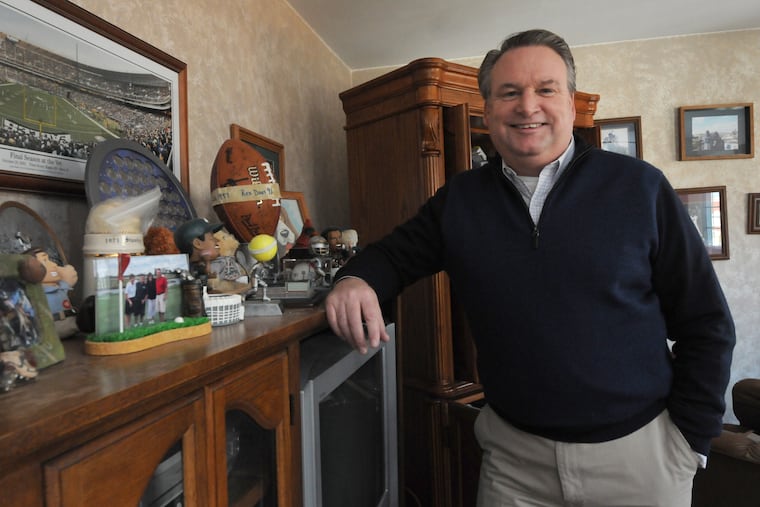It’s a Northeast Philly resident’s job to get U.S. lugers on the medal stand
Philly's ties to luge and a good showing at the Winter Olympics run right through the USA Luge CEO, Jim Leahy.

The drive from Northeast Philadelphia to Lake Placid, N.Y., covers more than 350 miles, can take close to six hours, and includes about as many turns as Jim Leahy’s four-decade ride through the sports business.
The West Chester grad makes that trek nearly every week, commuting from Philadelphia to upstate New York as the CEO of U.S. Luge. A career that began by guarding Ruly Carpenter’s box at Veterans Stadium continues this month in Beijing with Leahy’s third trip to the Winter Olympics.
“Just getting to the Games and this being my third Games, once you’re there and you’re not only heading up your own team but you’re part of the whole U.S. delegation, it’s pretty special,” Leahy said. “I remember walking in South Korea and you have your delegation jacket on and people just walk up to you and they want to take a picture. We thought they wanted us to take a picture of them. No, they wanted to take a picture of us with them in it.”
Leahy’s security gig at the Vet helped him connect with Bill Giles, who promised Leahy a job once he bought the Phillies. The Carpenters sold to Giles’ group in October and Leahy started in December. His first assignment was decided by a coin flip in David Montgomery’s office. Leahy went to the ticket office while Dennis Mannion — a longtime Phillies employee who later became an executive for the Colorado Avalanche, Denver Nuggets, Baltimore Ravens, Los Angeles Dodgers, and Detroit Pistons — was sent to the sales office.
“I’ve had so many mentors and what I think Bill and Monty were able to do was they created this sort of family atmosphere,” Leahy said. “You would spend so many hours at the ballpark, but if we had 50 or 60 people in the Phillies front office back then, that was a lot.”
Leahy spent six seasons with the Phillies before moving across Pattison Avenue in 1987 to join the 76ers after Pat Williams took a cast of front office officials to form the expansion Orlando Magic.
Leahy spent three seasons as the team’s director of ticket sales before Harold Katz fired him. An Inquirer reporter called Leahy, trying to get to the bottom of why he was let go. But Leahy had earlier received a call from Williams that provided the insight he needed to keep his career churning.
“He gave me the best advice about it being the nature of the business and sometimes it’s not the effort you put in. Things like that happen and if you want a long career, just keep quiet, find your next opportunity, and keep moving on. Best advice he ever gave me,” Leahy said. “So when the reporter called, it was just ‘No comment.’”
He quickly latched on with the New Jersey Nets, spending four years as a vice president. He later owned an Arena Football League team — his first home win was against Kurt Warner — and was a vice president for the Buffalo Sabres. He worked for MLS’s MetroStars, ran two minor-league hockey teams, owned a roller hockey team on Long Island, and spent a year overseeing ABC Radio’s sports acquisitions. It was quite a ride to Lake Placid.
“Over the course of my career, I’ve blended all of these individuals that I really admired and I blended a style that has kept me in the sports arena a lot longer than a lot of my contemporaries when I first started,” Leahy said.
“I have four boys and they all grew up in sports. The oldest grew up running around the locker rooms at the Vet and sitting on the bench at Nets games. I have twin boys that grew up hanging around the Arena Football League team and having catches with the players. Then with the triple-A hockey team, on Christmas Day, we put our skates on and put music on in the arena that held 7,000 people. Here we were skating on Christmas Day. So here my kids have all these memories of dad working in sports.”
» READ MORE: Pennsylvania luger’s Olympic dreams won’t be slowed by a broken finger
Leahy’s current post — which he started in 2013 — enlists him to grow luge in America and build an infrastructure that gets Americans on the medal stand. When he was hired, Leahy knew nothing about the sport except what he saw every four years at the Olympics. Now he’s helping the U.S. gain some ground in what is traditionally a European-dominated sport.
He helped generate $600 million in funding from the state of New York in 2021 to rebuild the training facility in Lake Placid that U.S. Luge shares with bobsled and skeleton athletes. The state-of-the-art facility was copied by the Italians and has been scouted by the Germans. Leahy secured a TV deal with NBC, bolstered the search program that finds future Olympians, and secured a World Cup event in Lake Placid that was canceled by the pandemic.
The U.S. has medaled in either men’s or women’s single luge events in two straight Olympics and sent eight Olympians to Beijing. If they find themselves this month on the medal stand, it’ll be a guy who lives in a Northeast Philly townhouse that helped get them there.